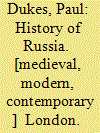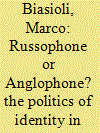| Srl | Item |
| 1 |
ID:
032051


|
|
|
|
|
| Publication |
London, macmillan Press, 1974.
|
| Description |
361p.: maps.Hbk
|
| Standard Number |
333128532
|
|
|
|
|
|
|
|
|
|
|
|
Copies: C:1/I:0,R:0,Q:0
Circulation
| Accession# | Call# | Current Location | Status | Policy | Location |
| 014567 | 947/DUK 014567 | Main | On Shelf | General | |
|
|
|
|
| 2 |
ID:
178850


|
|
|
|
|
| Summary/Abstract |
This article reveals the connections between Russian nationalism and Russian indie music. It argues that indie trendsetters’ views on music converge, perhaps unconsciously, with the state’s promotion of an assertive nationalism and its cultural implications, following the same politically inspired defensive mechanisms. In support of this argument, the article analyses the reaction by some music intermediaries in public discourse in the 2010s to the popularity of Russian Anglophone bands in local settings. The article thus reconceptualises the relationship between indi and politics in Russia since the Pussy Riot affair in 2012.
|
|
|
|
|
|
|
|
|
|
|
|
|
|
|
|
| 3 |
ID:
172505


|
|
|
|
|
| Summary/Abstract |
This article presents the results of a case study of the online community Russian Nationalism, one of the most popular Russian nationalists’ online communities on VKontakte in 2012–2016. The article aims to find out where network leaders and common members of nationalist online groups closed on the Russian Internet go and in which thematic communities they continue their activity. Russian Nationalism members’ personal profiles and friendly links on VKontakte were used as data sources. The metrics of social network analysis were used to study Russian Nationalism’s network structure. The study showed that the ban of a massive extreme right nationalist online group leads to an increase in the number of smaller shelter groups that retain their ideological basis, but abandon the clearly expressed hate speech; members of a banned nationalist group flow to groups whose content is both close (militaristic, cultural, and historical) and far (everyday) to the extreme right. The content of the latter can transform in line with the nationalist ideology. The case study of Russian Nationalism shows a high potential for diffusion of extreme right nationalist ideas in the Russian network space, which manifests in their ability to penetrate other thematic and ideological areas of public discourse.
|
|
|
|
|
|
|
|
|
|
|
|
|
|
|
|